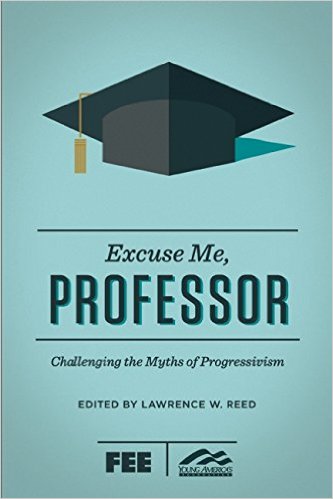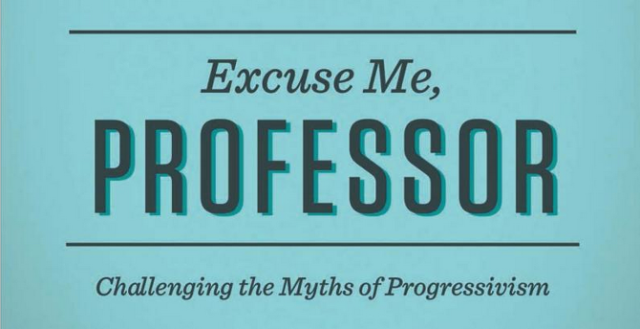Pity poor Emma Sulkowicz lugging a mattress around the Columbia University campus now for almost a full academic year.
This act, recalling Christ carrying his cross (that is if any on our college campuses know about this part of our Judeo-Christian heritage any more) has drawn attention to her alleged rape by fellow student and one-time lover, Paul Nungesser, who in turn has filed a Title IX suit against the university for allowing the campaign of harassment against him. Nungesser was cleared by a “campus court” (itself a disturbing extra-legal development).
Sulkowicz’s back-bending activity, however, is actually her senior thesis, “Carry That Weight,” directed by Jon Kessler, a professor in the School of Visual Arts. Kessler, who has received several grants from the National Endowment for the Arts, in the 1980s and 1990s made “kinetic sculptures,” and used video and surveillance equipment in his work to express “political urgency” after 9/11.
Sulkowicz seems to have learned from her professor about the new academic requirements and purposes of art, as her words in an email to AP reveal:
“I think it’s ridiculous that Paul [Nungesser] would sue not only the school but one of my past professors for allowing me to make an art piece. It’s ridiculous that he would read it as a ‘bullying strategy,’…when really it’s just an artistic expression of the personal trauma I’ve experienced at Columbia. If artists are not allowed to make art that reflect on our experiences, then how are we to heal?”
Sadly, Sulkowicz’s performance art project reflects a growing trend of professors giving students assignments that have little to do with real academics. Most colleges now require (or at least allow students to get credit for) service-learning, a sort of charity for liberal causes that garners academic credit. The exercises typically require work in homeless shelters, inner-city schools, parks, and even prisons.
For example, at Boise State University students taking Advanced Spanish Conversation and Composition (SPAN 303) last month went to Idaho Correctional Center in order to translate letters by Hispanic inmates for the American Prison Writing archive page. Students also learned about the collection in the prison library and job training programs for the inmates.
Predictably, the students’ “reflection papers,” many handwritten and on posters interspersed with photos, testified to how the program succeeded in changing stereotypes they held about prisoners. No doubt, the professor, Doran Larsen, whose c.v. includes a collection of prisoners’ writings, was pleased.
In this advanced Spanish language course, discussions with inmates and casual writing (in English) pushed aside hours of study that could have been devoted to Cervantes and Marquez. Likewise, the assignments accompanying service-learning projects are a degraded form of academics. “Reflection papers” replace traditional essays and research papers. One handwritten reflection paper on a poster board display paper looks like a third-grader’s journal. In the past, it would have been their language skills and knowledge about Spanish that mattered. Today, however, students are judged by their attitudes, not their knowledge.
Even in composition classes, reflection papers and participation in preselected protests, such as “Take Back the Night,” take the place of writing formal essays. Composition teachers, as I learned at the 2011 Conference on College Composition and Communication, take students on protests to study the “rhetoric” of slogans and “bodies,” instead of having them read classic works.
Such ideological and emotional assignments, and “performance art,” grew out of the 1960s protest movement and the rejection of Western standards. The radicals who went into academe embraced the new standards and have passed them on.
Performance art has become a favorite of feminists, who follow theorist Helene Cixous, who insisted, “Women must write through their bodies, they must invent the impregnable language that will wreck partitions, classes, and rhetorics, regulations and codes….”
One of the most famous purveyors of this mode is Karen Finley, who in her younger days famously smeared chocolate and honey over her body to express her feelings about the objectification of women. She then took her outrage over the revoking of funding by the National Endowment for the Arts to the Supreme Court, where she, along with her three co-litigants, lost. What is such a transgressive artist going to do without public funding?
She soon found a teaching position at New York University.
She landed there after she was denied a position at Georgia State University (where I earned my master’s degree) as a visiting professor after she refused to sign Georgia’s loyalty oath (requiring that applicants promise not to overthrow the government by violent means). At a 2009 South Atlantic Modern Language Association meeting, English department co-chair Matthew Roudané introduced her and related the story about how he had offered her the position after her NEA difficulties.
In her presentation, Ms. Finley recounted going into “a subtle form of body trauma” after seeing Georgia’s loyalty oath.
“You have to start with an individual, emotional place,” she insisted, describing her principled resistance and her form of art.
She would have fit in at Georgia State. One of my professors allowed another graduate student to write her final paper in the form of a “quilt” of colored paper. A feminist, she was defying the linear, patriarchal form of writing, i.e., organized with a thesis statement and argued logically.
Students are now being asked to follow the lead of performance artists like Finley and do assignments in the nude. This is the case of a visual arts class at UC-San Diego taught by Roberto Dominguez, who famously concocted an electronic Transborder Immigrant Tool, winning awards from the Endowment for Culture Mexico-US. In 2010 he used students to conduct a virtual sit-in to protest cuts in the budget for the California state university system.
Dominguez, naturally, has given a different version to the original complaint by a parent. He told Inside Higher Ed that students have two “clothes-free” options for the class: “The students can choose to do the nude gesture version or the naked version (the naked gesture means you must perform a laying bare of your ‘traumatic’ self, and students can do this gesture under a rug or in any way they choose—but they must share their most fragile self—something most students find extremely hard to do).”
In contrast, “’The nude self gesture takes place in complete darkness, and everyone is nude, with only one candle or very small source of light for each individual performance…. A student may decide to focus on their big toe, their hair, an armpit, as being a part of their body that is ‘more them than they are.’”
Presumably, this should alleviate parental concerns. But a room with naked (in distinction from nude) students in front of their nude professor blubbering about how they feel about their armpits illustrates vividly the decay of academe.
Such assignments do not prepare students for the world of work and adult responsibilities, where their emotions do not factor in performance reviews, where they are expected to communicate in a clear and logical manner, and where they will have to know certain facts in order to build a bridge, argue a legal case, treat a heart attack victim, or teach children to read. Nor do such assignments prepare them to participate as free and literate citizens in a constitutional republic.
So where is the oversight? In the case of the Boise State prison service-learning program, we can see that the inmates are indeed running the asylum. Sadly, this is happening in most of our institutions of higher learning.
EDITORS NOTE: This column originally appeared on the John Pope Center for Higher Education Policy.
 Too often, the message students get in college is that government is the answer to all social and economic problems. This happens in classes on history, sociology, politics, literature, and even in economics. You can graduate having heard only one narrative: the market has failed, so it must be replaced by all-controlling government bureaucracies.
Too often, the message students get in college is that government is the answer to all social and economic problems. This happens in classes on history, sociology, politics, literature, and even in economics. You can graduate having heard only one narrative: the market has failed, so it must be replaced by all-controlling government bureaucracies.




